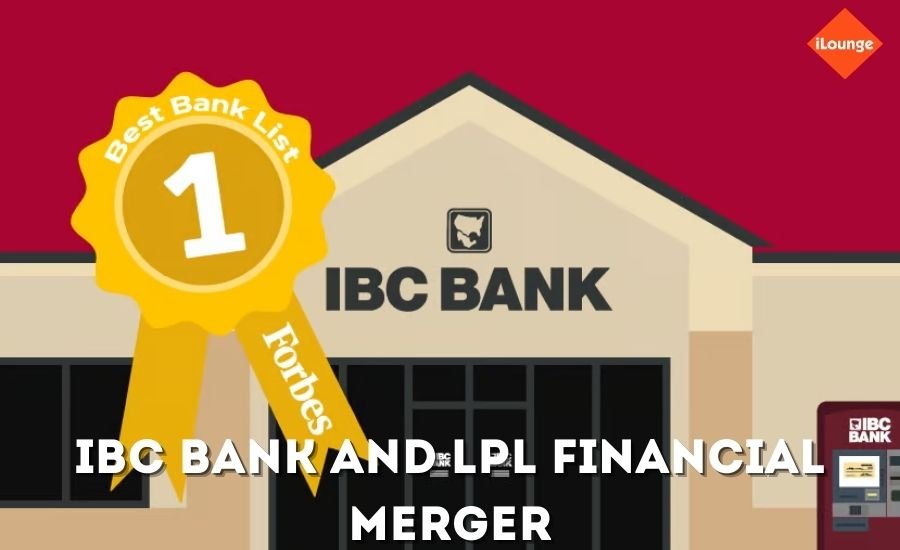IBC Bank and LPL Financial Merger: What It Means for Investors and the Financial Industry

In recent years, mergers and acquisitions (M&As) have reshaped the financial industry, bringing significant changes to the wealth management and banking sectors. One of the latest and most noteworthy developments is the merger between IBC Bank and LPL Financial. This partnership not only brings together a regional banking powerhouse and a leading independent broker-dealer but also promises a range of enhanced services, resources, and investment opportunities for clients and investors. In this article, we will dive deep into the implications of the IBC Bank and LPL Financial merger, exploring what it means for customers, how it compares to similar mergers, and what investors should consider in light of these industry shifts.
Background on IBC Bank and LPL Financial
Before examining the impact of the merger, it’s helpful to understand the histories, missions, and services offered by both IBC Bank and LPL Financial.
IBC Bank: A Regional Banking Leader
IBC Bank, formally known as International Bank of Commerce, was founded in 1966 in Laredo, Texas. Over the decades, IBC has expanded across Texas and Oklahoma, becoming one of the largest regional banks in the Southwest. With a focus on community-driven banking, IBC offers a range of financial products and services, including personal and business banking, loans, mortgages, and investment services through various partnerships.
IBC’s Commitment to Customers
The bank has built a reputation for prioritizing its customers and supporting the communities it serves. IBC’s motto, “We Do More,” reflects its commitment to going above and beyond traditional banking. By merging with LPL Financial, IBC aims to expand its range of financial services, particularly in the areas of investment and wealth management.
LPL Financial: A Leading Independent Broker-Dealer
LPL Financial, established in 1989, has grown into one of the largest independent broker-dealers in the United States. LPL provides financial advice and services to both individual investors and institutional clients, focusing on empowering financial advisors with the tools, technology, and support they need to succeed. LPL offers a diverse suite of services, including investment advisory, financial planning, and brokerage services.
LPL’s Advisor-Centric Model
A unique aspect of LPL Financial is its dedication to supporting independent financial advisors. By providing a platform that allows advisors to operate independently while benefiting from the resources of a larger institution, LPL enables advisors to offer highly personalized and flexible services to their clients.
Why IBC Bank and LPL Financial Chose to Merge
The IBC Bank and LPL Financial merger represents a strategic alignment, where each institution brings complementary strengths to the table. The merger was motivated by a shared goal: to create a more comprehensive suite of financial services for clients.
- Expansion of Investment Services: By partnering with LPL, IBC gains access to an extensive range of investment products, including mutual funds, annuities, and managed accounts. This means that IBC customers will now have more choices when it comes to their investment strategies.
- Technology Integration: LPL’s advanced technology platform is expected to enhance the customer experience for IBC clients. LPL’s state-of-the-art technology, including digital wealth management tools, data analytics, and streamlined account management, will give IBC’s customers a modernized approach to managing their financial portfolios.
- Increased Advisor Support: For advisors, the merger means access to more resources, educational tools, and administrative support. With LPL’s established advisor support model, IBC advisors will have the resources to provide more personalized and effective financial guidance to their clients.
- Broader Client Reach: While IBC Bank primarily serves the Southwest, LPL Financial has a national presence. The merger allows IBC to broaden its reach and attract clients who are looking for a community-oriented bank that also offers competitive investment services.
Key Benefits for IBC Bank and LPL Financial Clients
One of the primary goals of this merger is to create more value for both IBC and LPL clients. Here’s how the merger benefits the clients of each institution:
1. Enhanced Investment Options
Through LPL Financial, IBC Bank clients will have access to a broader range of investment products. Whether they are seeking retirement solutions, college savings plans, or general investment accounts, customers will have more options to choose from to meet their financial goals.
2. Improved Financial Advisory Services
LPL Financial is known for its focus on supporting independent financial advisors. As part of the merger, IBC Bank clients can expect more personalized advisory services. This could include retirement planning, tax strategies, and wealth management advice tailored to individual needs and goals.
3. Access to Advanced Financial Technology
Technology has become a significant factor in modern banking and investing. LPL’s advanced platforms for trading, portfolio management, and financial planning will be available to IBC Bank clients, enabling them to monitor and manage their investments more effectively.
4. Greater Financial Security and Compliance
As part of a larger organization, IBC Bank will benefit from LPL Financial’s compliance and security infrastructure. This is a critical advantage for clients, as it ensures that their assets are managed within a framework of regulatory compliance and ethical standards.
5. Streamlined Banking and Investment Experience
The merger will likely result in an integrated experience for clients, where banking and investment accounts can be managed in one place. This integration will make it easier for clients to handle their finances, view account summaries, and track their financial progress.
Read More: WWW.SCHWAB.COM
Challenges and Considerations for IBC Bank and LPL Financial Clients

While the merger presents numerous advantages, clients may also encounter certain challenges. Some of these challenges are common in large financial mergers, while others may be unique to the IBC Bank and LPL Financial partnership.
- Transition Period: Mergers often involve a period of adjustment as systems and processes are integrated. Clients might experience temporary disruptions in service or changes to familiar banking or investment processes during the transition phase.
- Potential Fee Changes: As IBC integrates with LPL Financial’s systems and offerings, there may be adjustments to fee structures for certain services. Clients should be aware of any changes to account maintenance fees, advisory fees, or transaction fees.
- Advisor Changes: Some IBC advisors may shift their roles or adjust their services as they integrate into the LPL system. Clients might experience changes in their advisory teams, which could require adjustments to existing client-advisor relationships.
- System Familiarity: IBC clients who are used to their current online banking system may need to learn a new platform as LPL’s systems are implemented. LPL’s platform, while advanced, may require clients to adapt to new tools and interfaces.
Comparing the IBC and LPL Merger to Other Financial Mergers
This merger is part of a larger trend within the financial industry, where banks and financial firms join forces to create more comprehensive service offerings. Comparing the IBC and LPL merger to similar recent partnerships helps highlight the strategic benefits and potential challenges associated with such mergers.
- LPL Financial and Atria Wealth Solutions: Recently, LPL acquired Atria Wealth Solutions, adding around 2,400 advisors and nearly 150 banks and credit unions to its network. This acquisition reflects LPL’s commitment to expanding its advisor network and providing a broader range of services, similar to the goals of the IBC merger.
- Morgan Stanley and E*TRADE: In 2020, Morgan Stanley acquired E*TRADE to enhance its digital services and reach a broader base of retail investors. This merger highlights the increasing importance of technology in wealth management, a priority that the IBC and LPL merger also shares.
- Charles Schwab and TD Ameritrade: The Schwab-TD Ameritrade merger brought together two major players in the discount brokerage industry, creating a powerful platform for retail investors. This merger underscores the benefits of scale in financial services, allowing firms to offer more competitive pricing and innovative technology.
What Investors Should Watch for Post-Merger
As the IBC Bank and LPL Financial merger progresses, there are several aspects that clients and investors should monitor to make informed decisions about their financial futures.
- Changes in Product Offerings: The merger may result in new products or changes to existing investment options. Clients should stay informed about how these changes could impact their portfolios.
- Service Improvements: Clients should also watch for improvements in service quality, advisor availability, and customer support. LPL’s commitment to supporting advisors could translate into better service experiences for IBC clients.
- Potential Cost Implications: Mergers often bring changes in fee structures. Investors should pay close attention to any updates in fee policies, particularly those affecting account management, advisory services, and transaction fees.
- Performance of IBC and LPL Stock (if applicable): For those who hold shares in IBC’s parent company or LPL Financial, tracking stock performance can provide insights into how the market views the merger’s success.
Conclusion
The merger between IBC Bank and LPL Financial marks a significant step in the evolution of financial services, bringing together the strengths of a regional bank and a leading independent broker-dealer. For clients, this merger promises a host of new opportunities—from enhanced investment options and improved financial advisory services to a more streamlined and secure banking experience. However, as with any major change, there are adjustments to be made and considerations to keep in mind. By staying informed and proactive, clients can navigate these changes successfully and make the most of the new offerings available through this strategic partnership.
Ultimately, the IBC Bank and LPL Financial merger reflects the shifting landscape of the financial industry, where customer needs for diverse, secure, and technologically advanced services drive the formation of larger, more integrated financial institutions.
FAQs
Q: What is the IBC Bank and LPL Financial merger about?
A: The IBC Bank and LPL Financial merger combines the resources of a regional bank and a leading broker-dealer to offer clients expanded investment options and financial advisory services.
Q: How does the merger benefit IBC Bank customers?
A: IBC Bank customers will gain access to more diverse investment products, enhanced financial technology, and personalized advisory services through LPL Financial.
Q: Will there be changes to fees for IBC and LPL clients?
A: Fee structures may be adjusted as the merger progresses, so clients should review any updates to account and service fees.
Q: How does this merger impact financial advisors at IBC Bank?
A: Advisors at IBC Bank will benefit from LPL’s extensive support, resources, and technology, helping them provide improved service to their clients.
Q: What new services will be available to clients after the merger?
A: Clients will have access to a broader range of investment options, advanced portfolio management tools, and more secure financial platforms.
Q: When will the merger be fully completed?
A: The full integration of services and systems is expected to be completed by mid-2025, with updates available throughout the transition.
Q: How can clients stay informed about changes from the merger?
A: Clients can stay updated by checking official announcements from IBC Bank and LPL Financial and by consulting with their financial advisors.
Up Next, Don’t Miss: SSD Solution Automatic DX-1

Specializing in insightful and engaging articles across a range of topics. With a keen eye for detail and a passion for delivering high-quality information, Mary helps readers stay informed with the latest trends and updates


